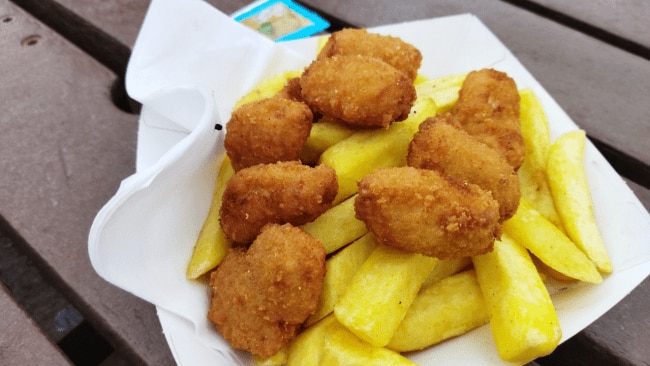Help! This is the only meal my child will happily eat
Having a preference for white or beige food is more common than you think. Aussie nutritionist Susie Burrell offers up some judgement-free advice if this is you.
Lifestyle
Don't miss out on the headlines from Lifestyle. Followed categories will be added to My News.
It may be some or all of the following - chicken nuggets, pasta, bread, rice, crackers, yoghurt and fries and whether your little ones eat a couple or all of the 'white foods', you are certainly not alone.
In fact, data suggests that as many as 40% of toddler-aged children exhibit fussy eating behaviours which can make mealtimes and eating out extremely challenging for concerned parents.
So, if you too have a white eater, here is what it may mean and how you can ensure they are still getting all of their key nutrients.
Want to join the family? Sign up to our Kidspot newsletter for more stories like this.
Why will my child only eat white foods?
There is no "one single reason" as to why a child may prefer white foods.
It may be the result of exposure, a preference for blander-tasting foods, or that the colour is not as overwhelming. It may be linked to a personality style or even early experiences with food. As is the case with all aspects of personality, a child may simply have a more finicky nature and be less open to new experiences, including trying new foods in general.
It can also be the case that during pertinent exposure periods, usually between two-three years, children may learn to prefer different foods over others. For example, if a two-year-old learns that if they reject their meat and vegetables, they are instead offered sweet yoghurts or salty potatoes, they will quickly learn to reject the less appealing foods in favour of some of these popular white options.
Often in our attempts as parents to make sure they ‘eat something’, we are inadvertently teaching them to eat more of what they are naturally drawn to and less of what they need to eat for an optimal nutritional intake.
RELATED: Mum’s genius fussy eater solution

Nutritionally do I need to be worried?
There are nutritional consequences of a diet filled largely with white foods at the expense of protein and vegetable-rich options, with the intake of a number of key nutrients including iron, zinc, vitamins A and C and dietary fibre shown to be significantly lower in the diets of fussy eaters.
Low intakes of such nutrients can impact digestion, growth, energy levels, and immune function over time.
Don’t beat yourself up
Nothing is achieved by getting upset with yourself for having a child who is a picky eater!
Parents generally do their best, and sometimes the pressures of busy, modern life means that we do not always have the time to work through the long-term behavioural change process of stubborn children who refuse to eat the healthy, balanced meals you have prepared.
Rather, start small and work to gradually improve your child’s nutrient intake over time, rather than putting more pressure on yourself and making it more of an issue than it already is.
Listen to Leah Goulis and Susie Burrell stage a parenting intervention with co-host Emily Blatchford (whose daughter is reluctant to eat nothing but beige food) on Mum Club Podcast. Listen and subscribe wherever you get your podcasts so you never miss an episode.
Small steps
Rather than seeking to solve the problem overnight, start by opting for high-fibre varieties of bread and pasta, make your own crumbed chicken or fish pieces rather than offering commercial varieties.
For chip fans, try making a range of different vegetable-based chips such as sweet potato or zucchini or carrot chips in the air fryer or oven. It is also easy to seek out child-friendly, fortified supermarket foods such as breakfast cereal, Milo and meal drinks such as Up & Go that have a number of key nutrients added to help ensure your child is getting some of the key nutrients they need.
And for the fussiest of children, it is certainly worth adding in a children’s multivitamin to the mix.
RELATED: Try Kidspot's easy homemade chicken nugget recipe

Try and avoid
One of the reasons fussy kids remain fussy is that they are continually offered the foods they like, for example, fries with dinner, or a special meal compared to the rest of the family.
If you continue to offer the more appealing option over regular food, you will never break the relationship with only white foods.
Another key thing to keep in mind is that in a country in which food is in abundance, our children are rarely really hungry, which means they have the luxury of rejecting some foods over others. All humans are much more likely to eat what is on offer when they are actually hungry, so when trying to shift a child’s eating habits, avoid loading them up with snacks and extras so that are they genuinely hungry when it comes to meal times.
More Coverage
Originally published as Help! This is the only meal my child will happily eat





